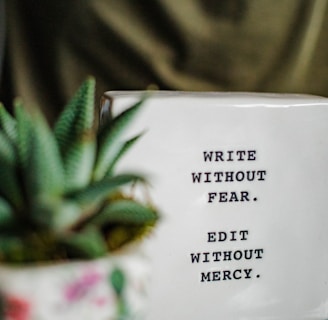The Art Of Editing: How To Self-Edit Like A Pro
The importance of editing your work
11/18/20232 min read


The Art of Editing
The Importance of Editing
For every writer, completing a first draft is a moment of joy and accomplishment. Yet, the work doesn't end there. The next crucial phase following manuscript writing is editing—a phase well-known among writers for its challenges. There's a saying by an unknown individual that resonates deeply: "Editing is where the real magic happens," and I couldn't agree more. In this post, we'll delve into the significance of editing and offer tips for refining your own work.
Why Edit?
Despite the challenges editing presents, it's an indispensable step for writers, both seasoned and novice, to finalize their work. Editing refines ideas, bolsters the overall message, and enhances the work's quality. Word choice holds immense importance in writing, and an editor can assist in selecting impactful words that elevate your writing. Fiction writers benefit from editors in enhancing character development, plots, and other critical elements. They provide a fresh perspective, often spotting mistakes overlooked by the writer. Moreover, their subjective insights can be invaluable. In summary, editors contribute significantly to a writer's confidence by refining the work, making it presentable to audiences or publishers.
How to Edit Your Own Work
Editing your own work is crucial even before presenting it to an editor. Begin by taking a break. A few days or weeks away can offer a fresh perspective when it's time to edit. It's also essential to celebrate the accomplishment—it's beneficial for your mindset. In my editing process, I typically start with grammar and spelling. However, if these aspects are your strengths, focus on larger tasks like plot development and pacing. Ensure a logical flow that engages readers. Review character consistency in their growth and motives. Scrutinize the dialogue for authenticity to the characters. Then, pay attention to language style, tone, and word choice—consistency is key. Strive for concise sentences by eliminating redundancy. Avoid unnecessary descriptions, adjectives, or adverbs. Reading your manuscript aloud aids in ensuring clarity. Seek feedback from beta readers or critique groups. Tools like Grammarly or Scrivener can assist with grammar and structure. Repeat the editing process several times—I typically stop after three drafts. Once done with editing, it's time to share your work. Whether querying agents, self-publishing, or sharing elsewhere, take pride in your accomplishments and celebrate.
Conclusion
Editing may be challenging, but it's an essential process. It refines your work, preparing it for public viewing. It fosters consistency and provides a confidence boost. While self-editing has benefits, if feasible, engaging an editor is highly recommended.
